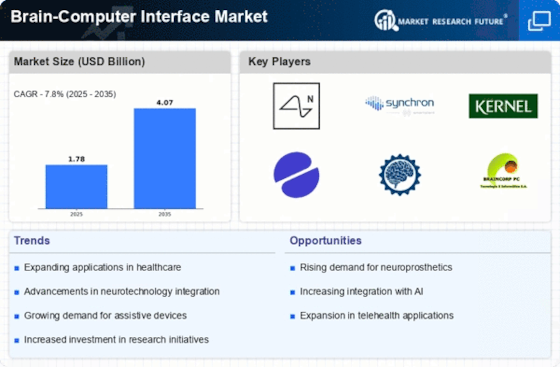Top Industry Leaders in the Brain Computer Interface Market

Competitive Landscape of Brain Computer Interface Market
The Brain Computer Interface (BCI) market, once confined to sci-fi narratives, is rapidly evolving into a multi-billion-dollar reality. This nascent field, where brain signals directly control devices, holds immense potential across diverse applications, from healthcare and rehabilitation to entertainment and gaming. As the market witness’s explosive growth, understanding the competitive landscape becomes crucial.
Key Players:
- Cadwell Industries, Inc (U.S.)
- Cortech Solutions Inc (U.S.)
- Inc NIHON KOHDEN CORPORATION (Japan)
- CAS Medical Systems, Inc (U.S.)
- Natus Medical Incorporated (U.S.)
- g.tec medical engineering GmbH (Austria)
- Medtronic (U.S.)
- Compumedics Neuroscan (U.S.)
- Brain Products GmbH (Germany)
- Integra Lifesciences (U.S.)
- Advanced Brain Monitoring, Inc. (U.S.)
Strategies Adopted:
- Specialization: Companies are focusing on specific application areas, like NeuroSky in education and gaming, and Gtec in rehabilitation and clinical research.
- Open-source platforms: OpenBCI's initiative is democratizing access to BCI technology, fostering collaboration and accelerating development.
- Strategic partnerships: Collaborations between BCI companies and established players in healthcare, entertainment, and defense are vital for market penetration.
- Data monetization: Leveraging anonymized BCI data for research and development offers significant revenue potential.
Factors for Market Share Analysis:
- Technology type: The market is segmented by BCI technology (invasive, non-invasive, partially invasive) and application (medical, research, consumer). Understanding the dominant players in each segment is crucial.
- Geographical distribution: The BCI market is skewed toward developed economies like North America and Europe. However, Asia Pacific is witnessing rapid growth due to rising healthcare expenditure and government initiatives.
- Regulatory landscape: Evolving regulations regarding data privacy and ethical considerations can impact market dynamics and influence company strategies.
- Intellectual property: Strong patent portfolios offer competitive advantages and can hinder new entrants.
New and Emerging Companies:
- CTRL-Labs' focus on non-invasive, electrode-free BCI for augmented reality and robotic control is gaining traction.
- Paradromics is developing BCI solutions for mental health monitoring and treatment, a rapidly growing market segment.
- BrainCo's focus on BCI for communication and accessibility for people with disabilities is garnering attention and investment.
Current Company Investment Trends:
- Focus on non-invasive BCI: Minimizing invasiveness and increasing user comfort is a key trend, driving investment in dry electrodes and near-infrared spectroscopy (NIRS) technology.
- Integration with AI and machine learning: AI is crucial for improving BCI signal interpretation and accuracy, leading to significant investment in this area.
- Miniaturization and portability: Developing compact and wearable BCI devices is essential for wider adoption, especially in consumer markets.
Latest Company Updates:
NeuroXess, a brain-computer interface (BCI) firm based in Shanghai, concluded its most recent round of funding in 2022 for "several hundred million" yuan, helping to address a market need in China with novel treatments for brain disorders. With international companies like Elon Musk-backed Neutralink, brain-computer integration is one of the most active study areas in the fields of brain science and artificial intelligence. Meanwhile, Shanghai has established a plan to build five future key industries, one of which is the advancement of brain research.
The endovascular brain-computer interface (BCI) startup Synchron said today that a $75 million Series C investment round, led by ARCH Venture Partners, had been oversubscribed and will take place in 2022. Greenoaks, Alumni Ventures, Moore Strategic Ventures, Project X, Reliance Digital Health Limited, Gates Frontier, Bezos Expeditions, and new investment.
Existing investors took part in the round, including Shanda Group, Khosla Ventures, NeuroTechnology Investors, METIS, Forepont Capital Partners, ID8 Investments, and University of Melbourne. With the Series C fundraising, $145 million has been raised overall since the company's founding.










